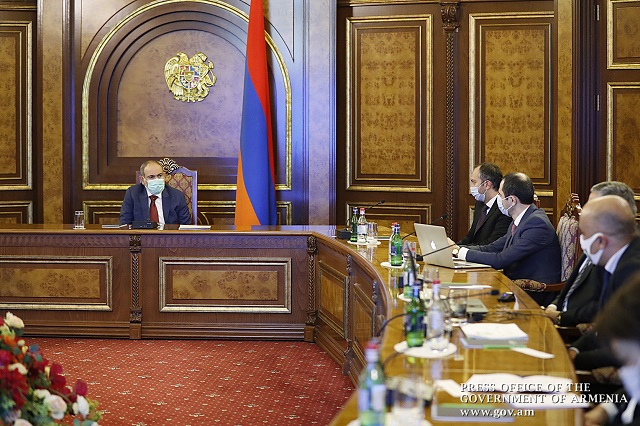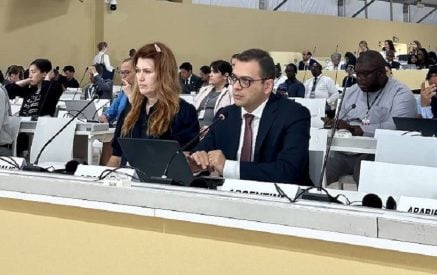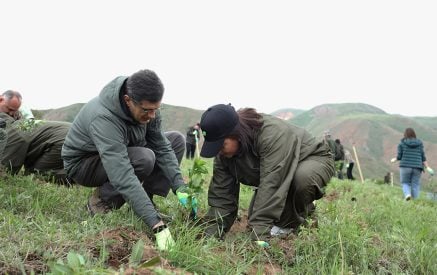The Food Safety Inspectorate, and the Nature and Subsoil Protection Authority today reported back their performance for 2019 and for the first 8 months of 2020.
Head of the Office for Coordination of Inspection Authorities’ Activities Artur Asoyan noted that the risk-based system of inspections has been introduced, and the legislative framework field has been streamlined in these agencies. He reported on the process of making new legislative amendments and gave some details of the projected changes.
Presenting the activities carried out in the period under review, Head of the Food Security Inspectorate Georgy Avetisyan noted that a new system of keeping registers of sanitary passports of vehicles transporting food was launched and control measures were taken in the sphere of food security.
As regards veterinary medicine, a mandatory requirement for the slaughter of animals in slaughterhouses is in place since July 1, 2020. Brucellosis-related surveys have been conducted in the provinces, involving farmers, dairy and meat producers and slaughterhouse workers. A monitoring program for pesticides, nitrates, heavy metals and genetically modified organisms in plant products has been launched. The Food and Agriculture Organization of the United Nations signed a document entitled “Capacity Building in Food Security, Animal Health Risk Assessment and Management,” which recommends introducing 3 per-sector risk assessment systems. A “one-stop-shop” border control system was launched on a pilot basis and international cooperation was developed.
Georgy Avetisyanalso reported on the ongoing organizational reform and the implementation of Premier’s instructions. Asked about the applicable food safety criteria, he noted that the inspectorate is guided by international regulations in this area. Nikol Pashinyan also inquired about the observance of the rules for the transportation of bread and bakery products, as well as about the availability of new slaughterhouses. The speaker advised that 67 slaughterhouses are operational at this point of time, 36 of which provide services, 78 such facilities are under construction. The sales volume reaches 90% in Yerevan, while the network keeps expanding in the regions. In this context, possibilities for building laboratory capacities were discussed during the meeting.
The Premier stressed the need to monitor compliance with food safety standards on a regular basis and told those responsible to be consistent in this matter. Nikol Pashinyan emphasized the need to set high standards in the field of food safety, strengthen laboratory capacity and instructed to submit proposals on all these issues.
Nature and Subsoil Protection Authority Chairman Gneil Hasratyan first presented the ongoing organizational reform, after which he talked about their initiatives. In particular, an environmental map has been developed and relevant signs will be placed in specific areas as part of the Wildlife Conservation initiative.
A new uniform has been approved for inspectors. The Program for Support of Protected Natural Areas, which seeks to build inspection capacity, provides for technological refurbishment and electronic control. The Authority has developed a draft decision on environmental monitoring in Lake Sevan’s water basin. New water meters were installed in fisheries. Checks were carried out at hydropower plants, which resulted in the installation of water meters.
More than 3000 irregularities were registered in the period between 2019 and 2020, for which administrative proceedings were instituted and administrative penalties and fines were imposed. As of the first 8 months of 2020, inspections have been conducted in 38 business entities, 18 of which have been completed and 20 are in the process of implementation.
In response to the Prime Minister’s questions, he reported on the monitoring of application of the new fishing procedure in the Sevan basin, measures to control poaching, illegal logging and hydroelectric power plants. A number of proposals and recommendations were voiced during the exchange of views that followed.
With reference to mines being exploited without permission, Nikol Pashinyan instructed to develop effective control mechanisms. Summing up the meeting, the Prime Minister stressed the importance of launching mechanisms for analyzing the activities of inspection bodies and assessing their effectiveness.
“We need clear-cut criteria not only in terms of inspections, but also for understanding the current situation in the spheres based on their results. The reports need to be analyzed in order to identify the problems and develop relevant solutions,” the Premier said, stressing that the process should be carried out in full conformity with the government’s per-sector strategies.
INFORMATION AND PUBLIC RELATIONS DEPARTMENT OF THE OFFICE OF THE PRIME-MINISTER OF THE REPUBLIC OF ARMENIA


























































